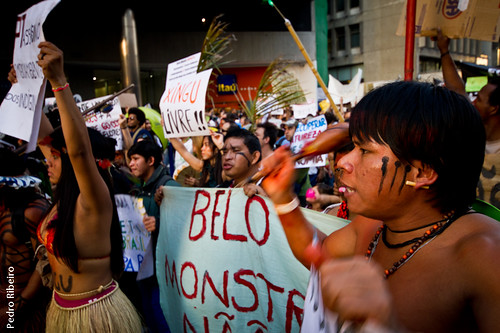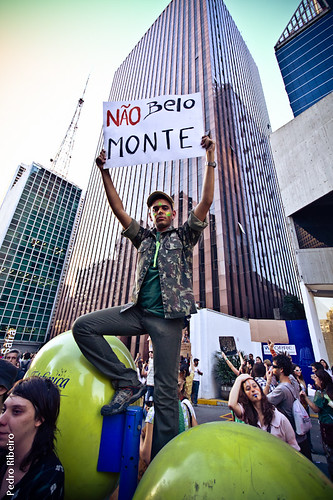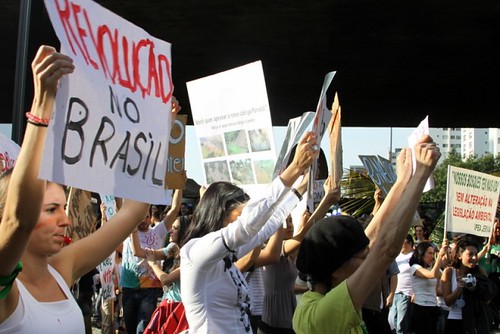This page is part of our special coverage Forest Focus: Amazon and Indigenous Rights.
Despite the protesting voices of citizens from many parts of Brazil – particularly the indigenous populations and traditional settlers of Volta Grande do Xingu region, who will be directly affected by the planned Belo Monte power plant dam – the government has not been convinced to forgo the scheme. The construction of Belo Monte hydroelectric power plant began in late June 2011, and is likely to become the world's third largest.
Agência Brasil informed on July 1 [pt] that the construction had been initiated on June 23. A week later, on July 7, members of the non-governmental organisation Xingu Vivo were on the construction site to closely observe the first developments and said on Twitter:
@xinguvivo: São 40 homens trabalhando desde a semana passada e a expectativa p/ a próxima semana é de que serão 400. E + 40 máquinas novas. #BeloMonte
On that same day, they saw ten construction vehicles [pt] conducting earthworks on the designated area to become the accommodation of future employees.

Indigenous communities demonstrate against Belo Monte, June 2011. Photo by Pedro_dm_Ribeiro on Flickr (CC-BY-NC 2.0).
One day before, on June 6, 300 women from across the state of Pará gathered together in the capital city, Belém, for the Congress of Women from the Countryside and the City. Xingu Vivo had one representative at the event, who published on Twitter the words of a woman, the leader of the Kayapó people:
@xinguvivo: Kayapó Tuíra: “só a unidade entre povos contra #BeloMonte poderá nos levar a vitória”. Discurso curto, mas muito denso
On the same day, a citizen from Bahia, Antônio Freitas (@tunynfreitas), tweeted that the dam had made its first impacts on the city of Altamira. Families had left the area due to be flooded and were unable to rent houses in the urban area; those families who had resorted to occupation of empty lots had been repressed by local police. He said:
@tunynfreitas: Construção de Belo Monte está aumentando os preços de aluguel em Altamira, Povo quer ocupar terreno sem uso, Polícia bate em manifestante
Debate has yet to reach media

Demonstrator against Belo Monte in Sao Paulo, June 19. Photo by Pedro_dm_Ribeiro, on Flickr (CC-BY-NC 2.0).
On July 11, Priscila Costa (@PriscilaCosta4) urged on Twitter for awareness:
@PriscilaCosta4: Nós temos o poder de autodestruição, vamos cuidar um pouco que seja do que nos resta, o planeta corre perigo! Diga não a Usina Belo Monte!
On July 2, during a preparatory seminar for the National Meeting of Communication Students (Encontro Nacional de Estudantes de Comunicação – ENECOM), Professor of Economy Eduardo Costa criticized the perception[pt] of the Amazon rainforest as subservient to economic interests:
O governo olha para a Amazônia ainda como uma eterna fornecedora de matéria-prima para o restante do país. Qual o papel o governo está relegando à Amazônia?
He believes the debate on the issue is active within society, but not in the media; as it has not appeared in the country's mainstream media, the issue has not reached the majority of the population.
Students organizing the event turned the discussion on Belo Monte into a goal of this year's National Meeting, which held a demonstration against the power plant in Belém:
@EnecomPA: O Ato do #Enecom2011 terá como tema Belo Monte. Por isso, siga @xinguvivo e leia mais aqui: http://migre.me/5cQL8 ehttp://migre.me/5cQMr
Activists in the cities of Salvador, Rio de Janeiro, Belém, Manaus, Porto Alegre and São Paulo – and even London – went to the streets on Sunday, July 17, to protest against Belo Monte power plant and its social and environmental impacts. Some people also expressed their rejection of the new Forestry Code, which was approved by the Chamber of Deputies and is now being analyzed by the Federal Senate.
On July 17, Movement Brazil for Life in the Forests (Movimento Brasil pela Vida nas Florestas) organized a sit-in [pt] on one of São Paulo's busiest crossroads, that of Paulista Avenue and Brigadeiro Luís Antonio Avenue. According to the movement's website, about 500 activists sat down on the crossroads as they held posters, “singing and protesting, for more than 20 minutes, their rejection to Belo Monte and to the changes on the Forestry Code”.
Below you can see a video of the march and see here photos of the sit-in.
Controversy around electricity generation
Global Voices has been tracking the case of the Belo Monte hydroelectric plant since the project was brought back to discussion, in 2010. Telma Monteiro, a specialist in processes of environmental licensing, has published on her blog an analysis [pt] of Brazil's Ten-Year Energy Plan (Plano Decenal de Energia – PDE), which makes the prospect even more critical.
Apart from the plants of Belo Monte, Tapajós, Madeira and Tocantins, the federal government intends to build at least 24 hydroelectric plants in Brazil between 2016 and 2020 – 10 of which are planned for the Amazon. In an interview with IHU – online, Monteiro criticizes the government's policy:
O governo brasileiro pretende lançar mão dos recursos naturais – exportando-os como commodities – para se transformar na quinta maior economia do mundo.
For some time, Ibama (Brazilian Institute of Environment and Natural Renewable Resources) refused to grant a license to the Belo Monte project, which caused internal tensions inside the institution, however the decision changed when current director Curt Trennepohl was appointed.
In mid June 2011, Trennepohl gave an interview to an Australian television station about Belo Monte. A dialogue recorded without his knowledge exposed the way Ibama's director comprehends the environment and the indigenous people of the Amazon. The interview was leaked, and journalist Gustavo Barreto wrote about it on his blog [pt]:
Indagado pela repórter se sua função seria de “cuidar do ambiente”, ele respondeu: “Não, meu trabalho é minimizar os impactos”.
Irritado com o tom recriminatório adotado pela jornalista, Trennepohl rebateu: “Vocês têm os aborígenes lá e não os respeitam”. Ouviu de réplica: “Então vocês vão fazer com os índios a mesma coisa que nós fizemos com os aborígines?”, para em seguida confirmar: “Sim, sim”.
Annoyed by the recriminatory tone used by the journalist, Trennepohl argued: “You've got aborigines in Australia and don't respect them”. She asked in return: “So you are doing to the indigenous peoples the same thing we've done to aborigines?”, and then he confirmed: “Yes, yes”.
August 20, day of protests
In spite of the beginning of the construction, the struggle has not yet been abandoned. On Saturday, August 20, protests are scheduled in 10 Brazilian cities and 16 countries [pt] against Belo Monte power plant and the Forestry Code's new project.
About a month ago, Global Voices author Diego Casaes tweeted:
@diegocasaes: Impossível que não haja uma alternativa à Belo Monte. I mean, seriously? Não tem UMA solução mais sustentável p/ prover energia p/ o Brasil?
And that's exactly the question demonstrators want to ask the government and other fellow Brazilians.
This page is part of our special coverage Forest Focus: Amazon and Indigenous Rights.









10 comments